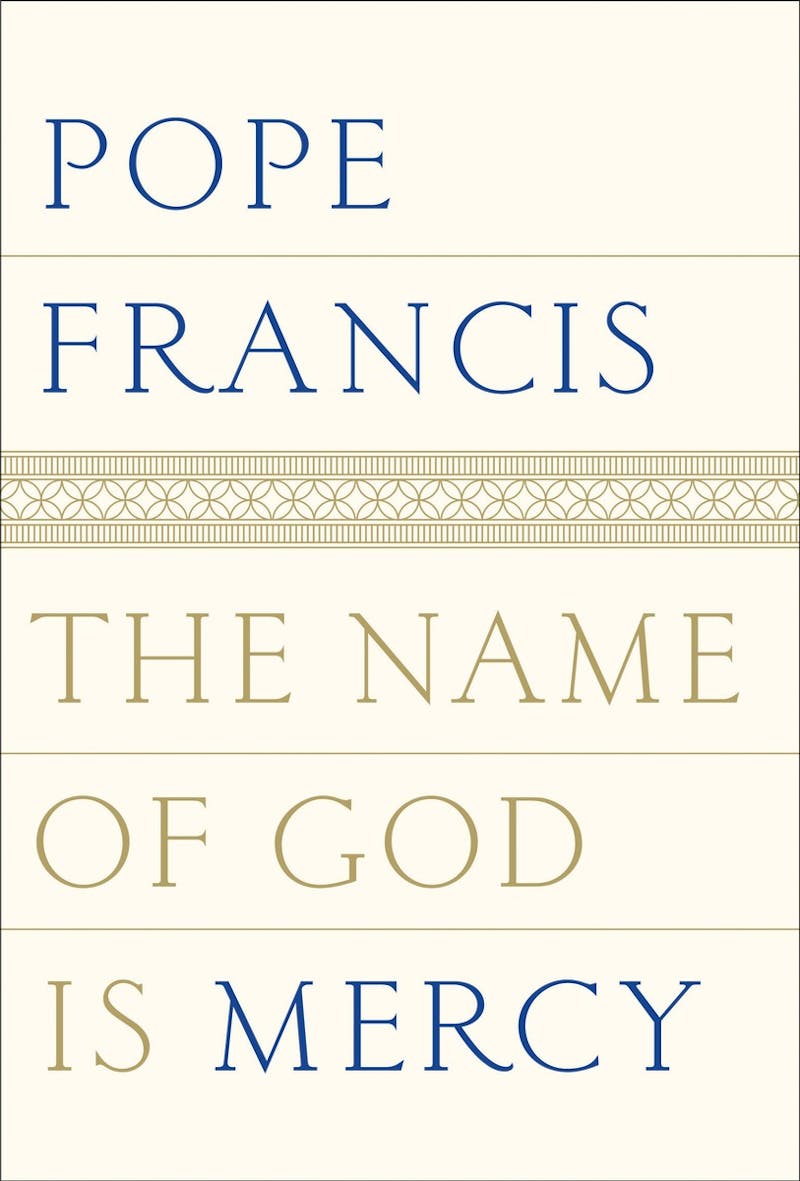After Pope Francis’s return from his 2015 trip to Latin America, he sat down with veteran Vatican reporter Andrea Tornielli for an in-depth theological interview that now makes up the majority of the new book The Name of God is Mercy. The slim, white volume also contains the papal bull announcing the Holy Year of Mercy, a special jubilee year decreed by Francis during Lent of 2015. But the majority of the book is a conversation between Francis and Tornielli, who has established himself as an enthusiastic chronicler of Francis’s papacy. In 2013, Tornielli published a kind of primer on the new pope, and in 2015 he wrote a spirited exploration of Francis’s views on capitalism and the Church’s social teaching.
But in The Name of God is Mercy, Tornielli turns from the world’s fixation on Francis and his famed displeasure with the ravages of capitalism, and renders a far more contemplative, theologically sensitive picture of the Argentinian priest who now leads the world’s 1.2 billion Catholics. There are certainly shades of Francis’s past remarks in the book; he refers to poverty as “one of the many slaveries of the third millennium,” and excoriates a man who, nonchalant about an affair with his maid, seemed to believe “in the existence of superior and inferior human beings, with the latter destined to be taken advantage of.” But Tornielli opens with a warning that the book is not an entry into the fervid genre of Francis-related media debate, which “often felt,” he says, “like a kind of match between fans of opposing teams.”
Instead Tornielli finds Francis deep in thought about the logic of God’s love, a more abstract matter than the casual Francis observer might usually happen upon in mainstream reporting. Mercy, Francis says, is God’s central attribute, and it is the Francis’s most treasured theological concept: the motto on the Pope’s coat of arms reads miserando atque eligendo, meaning, “by having mercy, by choosing him,” a reference to Christ’s forgiveness of the tax collector Matthew.

Francis says our era is an era of mercy, a time for the Church to show “her motherly face to a humanity that is wounded.” His commitment to mercy is rooted in a belief that the world is profoundly damaged, and that humanity is much immiserated by the “fragility of our era.” The pope is explicit about human nature, which is “wounded by original sin,” and prone thereby to weakness, foolishness, and failure. Here Francis reiterates his long-standing position that morality is about keeping up the good fight. “The most important thing in the life of every man and every woman is not that they should never fall along the way,” Francis explains, “the important thing is always to get back up.”
Which raises the question: Why? “If God limited Himself only to justice, he would cease to be God and would instead be like human beings, who ask merely that the law be respected,” Francis writes. God’s mercy isn’t only a mechanism for reviving the possibility of obedience to divine law. There’s something more. If not merely the potential for accordance with rules, what is it God’s mercy is meant to accomplish for us?
Exploring that question is best done through another: If God doesn’t extend mercy, what instead does He do? There are two possible answers, depending on how you conceive of God’s judgment. If God’s judgment is always righteous, as Christians maintain, then His mercy is a superabundance of love and forgiveness that takes the place of a deserved punishment. If you are less convinced of God’s righteousness, then mercy might replace something like excessive vengeance or arbitrary retribution. In either case, though, mercy restores peaceful accord where the possibility of destruction (legitimate or not) had been prompted.
“You will continue to be the chosen people,” Francis imagines God saying to Israel in the Book of Ezekiel, “and all your sins will be forgiven.” Your sins, in other words, will not loose you from the love of God. God’s mercy has the effect of continuing a relationship rather than ending it; God’s mercy subverts the relationship-devastating destruction of sin by replacing a potentially fatal settling of accounts with a profusion of love. Mercy is God’s way of not being done with you: think of people you have wronged, and the ones who have chosen not to get even are likely the ones you feel most indebted to. And so we are.
Maybe this indebtedness feels maddening, confounding. God’s mercy is “a gift that is so overabundant it may even seem unfair in our eyes,” Francis shrewdly notes. But the nature of God’s mercy is its excess; it balances nothing, it is required by nothing, it is not deserved. It is “the divine attitude which embraces,” the how of God’s forgiveness, but not forgiveness itself. It’s a feeling, Francis seems to believe, one that moves God and His beloved humankind. It is the sinew that binds God to humanity, humanity to God; it’s something like an emotion, something like an urge, something that Francis again and again says must be experienced. It is the elemental mystery Augustine realizes in book one of his Confessions when he wonders: “Why do you mean so much to me? Help me find words to explain...Have pity on me and help me, O Lord my God. Tell me why you mean so much to me. Whisper in my heart, I am here to save you.”
For observers of Francis’s papacy who have been looking for a unifying logic beneath his many interests—encounter, equality, a reintegration of the marginalized, an opening of doors—The Name of God is Mercy will be tremendously informative. But even for the layperson not much interested in papal affairs, Francis’s gentleness and insight will provide a heartening buffer against a world that, as the Pope himself observes, often seems darkly apathetic, which is probably how Francis would prefer his little book serve, as his motto suggests.
